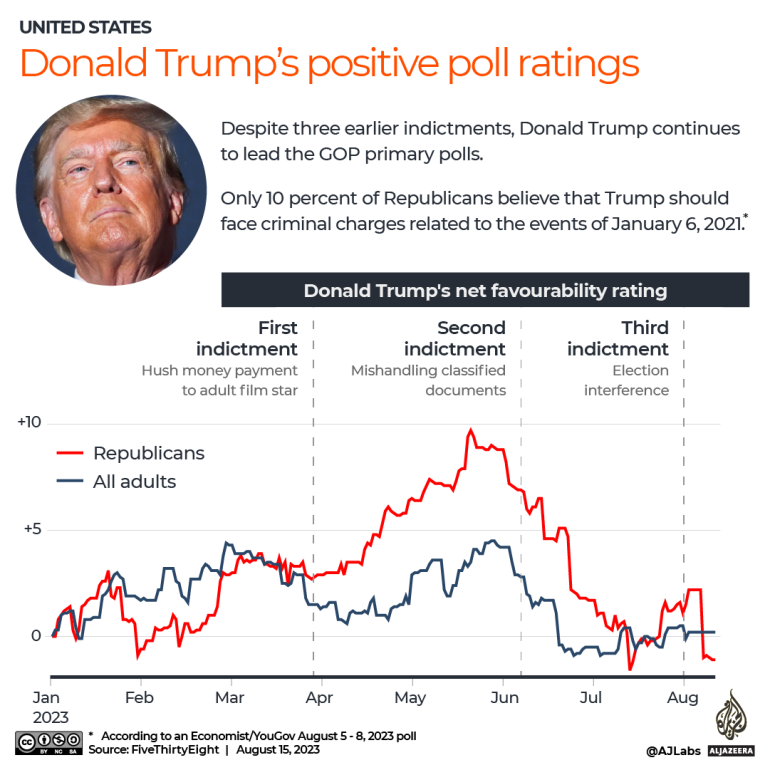Trump to be booked in Georgia election case: Here’s what to expect
Former US president to turn himself in at the Fulton County jail in Atlanta to face 2020 election interference charges.

Donald Trump is set to turn himself in to authorities in the US state of Georgia, where the former United States president faces criminal charges over his efforts to overturn the result of the 2020 election.
Trump has said he will travel to the Fulton County jail in the state capital, Atlanta, on Thursday, but he has not given a specific time for his arrival.
Keep reading
list of 3 itemsTrump says he will surrender on Thursday in Georgia election case
Deja Vu: The dark prospect of Trump 2.0
It will be the fourth such surrender since April for Trump, who has been indicted in three other criminal cases this year but remains the frontrunner in the Republican Party’s 2024 presidential nomination race.
While some aspects of the legal proceedings in Georgia will be familiar, others are set to be new because this is the first criminal case Trump has faced under the state’s jurisdiction.
Here’s what to you need to know:
What will happen when Trump surrenders?
Fulton County Sheriff Pat Labat has stressed that he plans to treat Trump the same way he treats other suspects booked at the Fulton County jail.
That means Trump will likely be fingerprinted and have his mugshot taken after he turns himself in.
If that does happen, it will be the first time the former president has had his mugshot taken in any of the four criminal cases against him. His legal team had been able to evade the common procedure previously.
“Unless somebody tells me differently, we are following our normal practices, and so [it] doesn’t matter your status, we got mugshots ready for you,” Labat told local media after Trump’s indictment this month.
The jail is open 24 hours a day and Georgia authorities have given the ex-president and his 18 co-defendants until Friday at noon (16:00 GMT) to turn themselves in.
Will Trump stay in jail?
The Fulton County jail has become notorious for its unsanitary and unsafe conditions, and the US Department of Justice last month opened an investigation into the facility.
Fifteen incarcerated people died at the jail last year, according to the Atlanta Journal-Constitution, and there have been four deaths reported in the past five weeks.
However, Trump is not expected to spend long there. His legal team has already negotiated a $200,000 bond agreement, meaning he will be immediately released after being booked and paying at least 10 percent of the bond.
The Fulton County Sheriff’s Office has said there will be “a hard lockdown” of the area surrounding the jail with no one allowed in or out when Trump arrives.
Trump’s former lawyer John Eastman and Republican poll watcher Scott Hall, who were also charged in the case, surrendered on Tuesday.
When will Trump be arraigned?
In each of the other criminal cases against Trump this year, the former president was booked, and then shortly afterwards, he was taken before a judge for a brief arraignment hearing to formally hear the charges and enter his plea.
In Georgia, these processes will be done separately.
Fani Willis, the Fulton County district attorney, who brought the case against Trump and his co-defendants, has asked for the arraignments to take place the week of September 5 and for the trial to begin on March 4, 2024. No dates have currently been set.
The arraignment in Georgia could also be unique because television cameras are generally allowed in courtrooms in the state depending on the judge’s discretion.
That would stand apart from Trump’s arraignment in New York in April on charges linked to a hush-money payment made to a porn star, where only still cameras were allowed.
It would also differ from Trump’s two previous federal arraignments – on election interference charges and allegations he mishandled secret government documents – after which only courtroom sketches of Trump were released.
Judge Scott McAfee, who is presiding over the Georgia case, can decide whether Trump needs to appear in person for his arraignment or whether he can appear virtually.

What were Trump and his co-defendants charged with?
In the 98-page Georgia indictment released last week, prosecutors charged Trump and his 18 co-defendants – including Trump’s White House Chief of Staff Mark Meadows and his high-profile personal lawyer Rudy Giuliani – with a total of 41 criminal counts.
Trump faces 13 charges, including soliciting a public officer to violate his oath, conspiracy to commit forgery, and making false statements and filings.
All of the defendants, including Trump, also face a racketeering charge under the state’s Racketeer Influenced and Corrupt Organizations Act, known as RICO.
The charge, which is usually reserved for organised crime and corruption, allows prosecutors to target multiple people who commit separate crimes while working towards a common goal.
The Georgia case is also the first time Trump has faced charges that carry a minimum sentence. That would mean that if convicted on those charges, the ex-president would be required to serve prison time.
Will the Georgia case affect Trump’s re-election bid?
The Georgia case along with Trump’s three other criminal indictments have created a scheduling headache for the ex-president as he seeks the Republican presidential nomination.
The trials are likely to begin in the heat of the 2024 campaign season, and Trump’s legal team is expected to try to delay the start of the legal proceedings.
Under the US Constitution, there is no restriction on Trump running for or being elected president, even if he is convicted of the crimes. However, the current situation is unprecedented, and it is unclear how a possible prison sentence would be navigated.
Trump has denied the charges in all the cases, saying the indictments are part of a coordinated political attack that aims to derail his re-election bid.